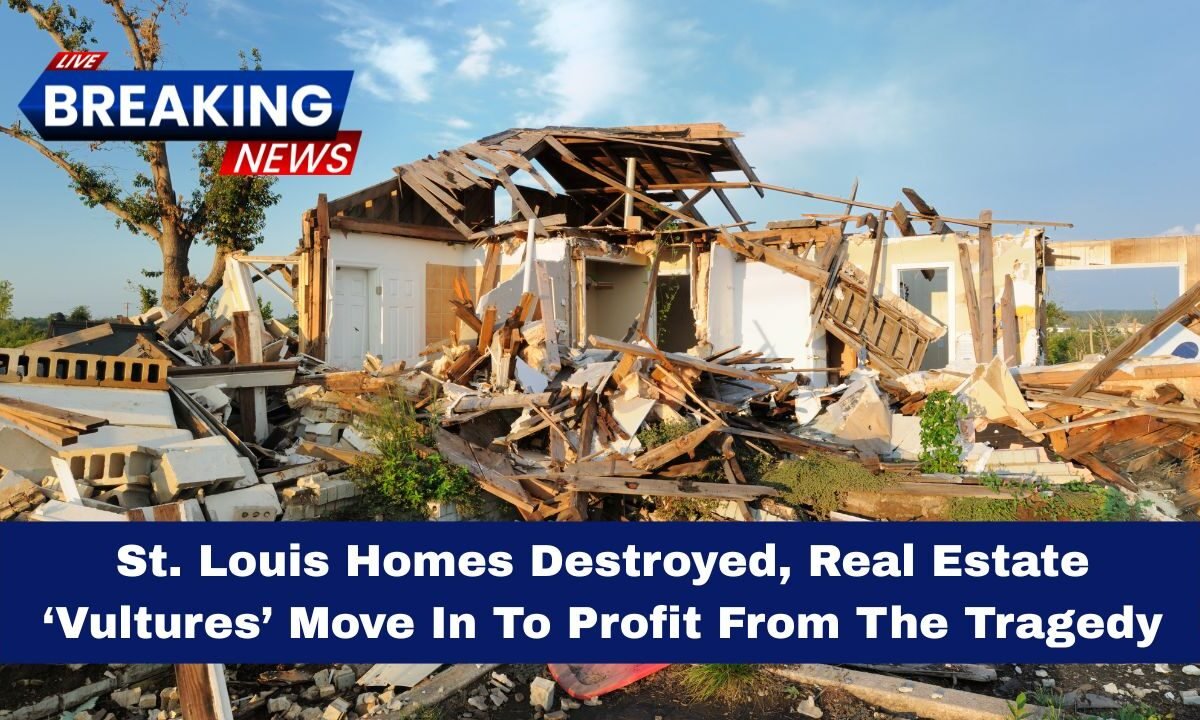On May 16, 2025, a mile-wide EF-3 tornado devastated parts of St. Louis, Missouri, leaving thousands of families without homes, possessions, and sometimes, their loved ones.
As the community struggles to rebuild, real estate speculators have descended on the area, seeking to profit from the tragedy by purchasing homes at depressed prices.
This has sparked a growing concern about disaster gentrification, with many residents caught in a difficult position: to sell at a deep discount or fight to rebuild their lives.
In this article, we’ll explore the aftermath of the tornado, how real estate vultures are exploiting the situation, and what steps homeowners can take to avoid falling victim to opportunistic buyers.
The Devastation- St. Louis Tornado of 2025
The tornado that tore through St. Louis was part of a 48-hour storm system that left 26 people dead and 168 injured across multiple states. DeAmon White, a local resident, vividly recalls how his home was destroyed, with the back wall torn off and the interior damaged beyond repair.
His mother’s house was also severely impacted, though her flower garden somehow survived the storm’s 150 mph winds.
In the days following the storm, real estate speculators quickly began targeting residents. DeAmon was bombarded with calls, texts, and flyers offering to buy his property for cash, often at prices much lower than the homes’ true value.
Real Estate ‘Vultures’ Move In
As the dust settled in North St. Louis, real estate investors began circling. For many homeowners, the damage was so severe that they were left with few options. Without insurance, and with federal aid still slow to arrive, offers from these speculators seemed like a lifeline.
In a neighborhood where 63% of renters and 49% of homeowners are uninsured, many residents felt forced to accept low-ball offers from real estate firms offering quick cash sales.
These investors typically prey on the vulnerabilities of disaster-stricken homeowners, offering them immediate financial relief in exchange for their properties, which are often worth much more once the area is rebuilt.
The Rise of Disaster Gentrification
This phenomenon, often referred to as “disaster gentrification”, occurs when real estate investors exploit natural disasters to acquire properties at a fraction of their true worth.
After Hurricane Katrina, New Orleans saw similar patterns of exploitation, with wealthy developers buying up properties in devastated neighborhoods for pennies on the dollar.
St. Louis is now witnessing the same trend. Speculators are making aggressive offers to homeowners, especially those who don’t have the means to rebuild.
This is leading to concerns about long-term displacement for the low-income and Black communities that have historically lived in areas like North St. Louis.
The Economics Behind the Offers
The tornado has created a market opportunity for investors who see disaster-affected homes as an easy way to make a profit. These buyers are often offering cash, which seems like a quick fix for homeowners desperate for a solution.
However, these offers typically come well below the market value of the property, and some homeowners are unknowingly selling their homes for far less than they’re worth.
The Impact on Local Communities
The St. Louis community has always been a multigenerational neighborhood, with many homes dating back over a century.
These homes are a testament to the strength and history of the area, built from some of the most durable materials, including renowned bricks from the city’s early manufacturing era.
However, with so many residents now facing difficult financial decisions, the future of these historic neighborhoods is uncertain.
As DeAmon White observed, gentrification is already taking place, with upscale businesses and more affluent residents moving into areas that were once affordable for working-class families.
What Homeowners Can Do
For homeowners facing predatory offers, it’s important to take certain steps to protect their property and financial future:
- Don’t rush to sell: It’s easy to feel pressured, but waiting for the right offer can help you avoid making a regrettable decision.
- Seek professional advice: Contact a real estate agent or attorney to better understand the value of your home and your options.
- Look into government assistance: Programs like FEMA or local non-profits may be able to help with rebuilding costs or offer bridge funding to buy more time.
The aftermath of the St. Louis tornado has highlighted a troubling trend in the aftermath of disasters—disaster gentrification.
As real estate speculators move in to capitalize on damaged properties, they often take advantage of vulnerable homeowners, offering quick cash sales at prices far below market value.
It’s essential for residents to be aware of the long-term consequences of selling their homes too quickly and to seek legal and professional advice before making any decisions.
While the temptation of quick cash may seem appealing, it’s important to weigh all options carefully to avoid being exploited.




